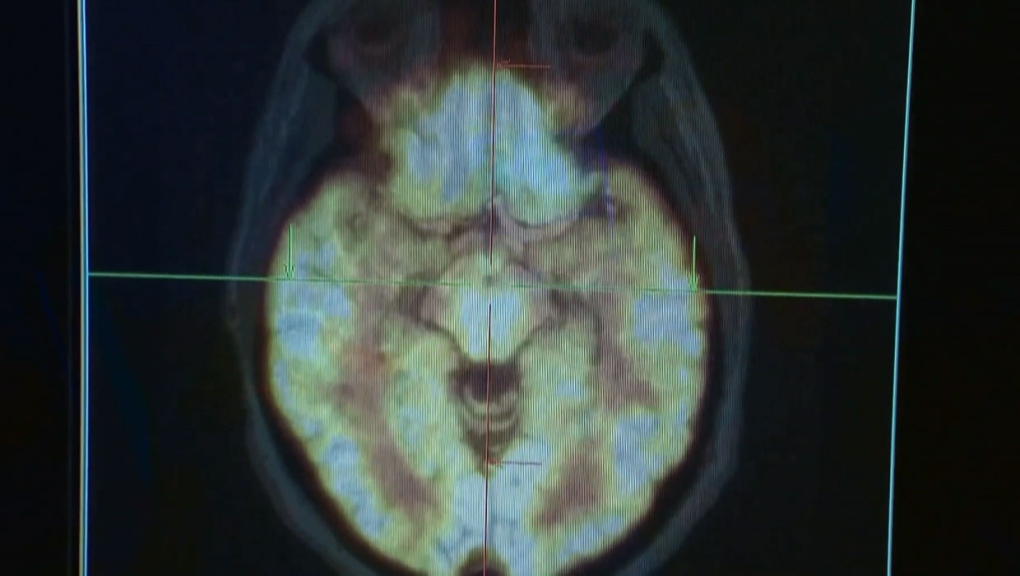Woman with neurological disorder helped by made-in-Calgary medical treatment
A Calgary-based treatment program – the only one of its kind in Alberta – is giving new opportunities to people who suffer from neurological disorders.
Calgary's South Health Campus is home to the regimen that has helped approximately 100 patients so far.
One of those individuals is Vanessa Jollimore, who says her case of functional neurologic disorder completely changed her life.
The 47-year-old says she first realized something was wrong in September 2020.
"I presented with some symptoms that looked like a stroke. The neurologist that I saw in the hospital was quite puzzled because he couldn't figure out what was going on – it was so clear that it looked like a stroke but none of the tests showed that it was a stroke," Jollimore told CTV News in an interview.
The issues she described began with a numbness in her foot, which spread to her hand. Her speech also became impaired.
Eventually, a neurologist determined that Jollimore had functional neurologic disorder, a problem where the brain isn't sending the proper messages to the rest of the body.
"I was trying to find words that were in my brain but I couldn't retrieve them to use them," she said.
"I knew exactly what I wanted to say, but I couldn't say it."
Once she had her diagnosis, Jollimore was connected with a team of doctors and specialists at the South Health Campus that have seen – and successfully treated – cases of functional neurologic disorder before.
Treatment for the disorder is conducted through a five-day program, built by physiotherapist Jacquie Townsend in 2018.
She told CTV News that what happened to Jollimore is fairly common and is often sparked by periods of extreme stress or another serious injury.
"A lot of people are affected by this. It's relatively costly to the health care system because these patients are actually known to utilize emergency department visits or specialist visits more often than adults with other comparable neurological disorders."

Through the treatment program, patients are able to access supports from all the personnel they need – psychologists, physiotherapists and speech pathologists – in order to learn strategies to control their symptoms and lead normal lives.
Jollimore says while it hasn't been easy, the program has been so successful in her case that she's been able to return to work.
"I have to dig into the tools that they've given me, the coping strategies and the exercises, to remind my body to respond to my brain signals," she said.
She adds there have been a few relapses in the two years since her treatment, but staff with the program have been able to help out as needed.
"I can't say enough about them. They gave me my life back – they put me back together."
(With files from Kevin Nimmock)
CTVNews.ca Top Stories

Trudeau's 2024: Did the PM become less popular this year?
Justin Trudeau’s numbers have been relatively steady this calendar year, but they've also been at their worst, according to tracking data from CTV News pollster Nik Nanos.
Back on air: John Vennavally-Rao on reclaiming his career while living with cancer
'In February, there was a time when I thought my career as a TV reporter was over,' CTV News reporter and anchor John Vennavally-Rao writes.
Death toll in attack on Christmas market in Germany rises to 5 and more than 200 injured
Germans on Saturday mourned both the victims and their shaken sense of security after a Saudi doctor intentionally drove into a Christmas market teeming with holiday shoppers, killing at least five people, including a small child, and wounding at least 200 others.
Overheated immigration system needed 'discipline' infusion: minister
An 'overheated' immigration system that admitted record numbers of newcomers to the country has harmed Canada's decades-old consensus on the benefits of immigration, Immigration Minister Marc Miller said, as he reflected on the changes in his department in a year-end interview.
Summer McIntosh makes guest appearance in 'The Nutcracker'
Summer McIntosh made a splash during her guest appearance in The National Ballet of Canada’s production of 'The Nutcracker.'
The winter solstice is here, the Northern Hemisphere's darkest day
The winter solstice is Saturday, bringing the shortest day and longest night of the year to the Northern Hemisphere — ideal conditions for holiday lights and warm blankets.
It's eggnog season. The boozy beverage dates back to medieval England but remains a holiday hit
At Scoma's Restaurant in San Francisco, this holiday season 's batch of eggnog began 11 months ago.
Warrants issued for 'violent offenders' after Nanaimo jewelry store robbery
Authorities are asking for the public 's help finding two suspects wanted in connection with a Nanaimo, B.C., jewelry store robbery earlier this year.
In a calendar rarity, Hanukkah starts this year on Christmas Day
Hanukkah, Judaism’s eight-day Festival of Lights, begins this year on Christmas Day, only the fourth time that’s happened since 1900.

































